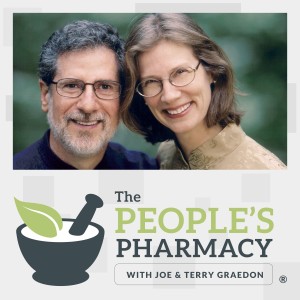
Show 1343: Hidden Harms of Herb and Drug Interactions
 2023-06-09
2023-06-09
Millions of Americans take dietary supplements, and most of us assume that they are safe. While that is probably a reasonable rule of thumb, there are some situations that require more vigilance. In particular, we need to beware of herb and drug interactions. Even your doctor may not know about the hidden harms.
How Risky Are Herb and Drug Interactions?It’s easy to compartmentalize–drugs in the pill box, herbs in the bottle. Even though we think we can easily distinguish between medications and natural products, our bodies cannot. Our cells use the same machinery (mostly enzymes) to manage whatever we take, including food and herbs as well as drugs. Certain herbs, such as St. John’s wort (Hypericum perforatum), have profound effects on those enzymes. That, in turn, can change how our bodies handle medications we may be taking. Might taking St. John’s wort to ease a depressed mood result in birth control pills losing their effectiveness?
Waking Up with Grapefruit:The tart taste of grapefruit juice is certainly a wonderful way to wake up sleepy taste buds in the morning. But we are talking here about a different sort of wake-up call. Back in 1991, scientists published a study with some astonishing results. Grapefruit juice used to mask the flavor of alcohol significantly increased blood levels of the blood pressure pill felodipine (Lancet, Feb. 2, 1991). This was enough to produce unpleasant symptoms such as flushing and dizziness. Orange juice did not produce the same effects.
Why was this a wake-up call? First of all, it was the first report of grapefruit affecting medications. There is now a significant list of drugs that interact with grapefruit. Elevated blood levels of these medicines can make side effects more likely.
Secondly, the importance of grapefruit interactions with felodipine, simvastatin and other common medicines alerted us to the possibility of herb and drug interactions. These are not always widely publicized, though. How can you protect yourself from the hidden harms
Learning About Herb and Drug Interactions:If you are taking herbal supplements as well as pharmaceuticals, ask your pharmacist to help you check on potential interactions. The website for the National Center for Complementary and Integrative Health (NCCIH) has some information that can be helpful. Moreover, your pharmacist should have access to the Natural Medicines Database, an excellent resource on this topic. Other online resources such as WebMD or drugs.com may also guide you to information.
One problem is that scientists have not studied herb and drug interactions extensively. Some of the warnings that you may find online might be based on test tube studies that don’t always translate well into human bodies. For example, some sites warn that ginkgo and ginseng interact with numerous drugs. In practice, however, integrative healthcare providers rarely see any hidden harms associated with these herbs.
There are other herbs that may interact with drugs, however. Goldenseal and the berberine compound it contains may interact with several medicines, including aromatase inhibitors, statins, metformin and anti-androgens (Scientific Reports, June 16, 2016).
Drug and Nutrient Interactions:Herb and drug interactions are not the only possible sources of hidden harm. Some medicines can increase nutritional requirements. For example, the diabetes drug metformin can lead to low levels of vitamin B12 over time. People taking this medication for an extended time should have their B12 levels tested every year. They may need to take supplements.
Another nutrient-interaction appears with blood pressure pills known as ACE inhibitors or ARBs. These can reduce levels of zinc, a mineral that is critical for proper immune function. Testing for zinc is difficult, and doctors don’t often do it.
Discussing Herb and Drug Interactions with Your Healthcare Partner:Some people are reluctant to tell their doctor or PA that they are taking herbal supplements. They worry that the provider will scold them or make fun of them. But to protect yourself from the hidden harms of herb and drug interactions, it is essential to talk about what you are taking and why. You may be able to adjust either your medication regimen or your herbal supplements.
This Week’s Guests:D. Craig Hopp, Ph.D., is deputy director of the Division of Extramural Research at the National Center for Complementary and Integrative Health (NCCIH). In addition to serving as deputy director, Dr. Hopp continues to oversee the administration of the product integrity policy. This involves evaluation of proposed study materials to ensure they are safe and properly characterized. He also focuses on large-scale projects such as research on drug-natural product interactions, the innovation and technology research center, and the Consortium for Advancing Research on Botanical and Other Natural Products (CARBON) program. Dr. Hopp uses his expertise and experience in the field of natural products to help shape research priorities at NCCIH. https://www.nccih.nih.gov/about/staff/d-craig-hopp
The photo of Dr. Hopp is by Lisa Helfert.
Craig Hopp, PhD
Dr. Tieraona Low Dog is a founding member of the American Board of Physician Specialties, American Board of Integrative Medicine and the Academy of Women’s Health. She was elected Chair of the US Pharmacopeia Dietary Supplements/Botanicals Expert Committee and was appointed to the Scientific Advisory Council for the National Center for Complementary and Alternative Medicine. Her books include: Women’s Health in Complementary and Integrative Medicine; Life Is Your Best Medicine and Fortify Your Life: Your Guide to Vitamins, Minerals, and More. Her website is drlowdog.com
Dr. Tieraona Low Dog describes natural ways to treat heartburn
The podcast of this program will be available Monday, June 12, 2023, after broadcast on June 10. You can stream the show from this site and download the podcast for free.
Download the mp3.
More Episodes
Create your
podcast in
minutes
- Full-featured podcast site
- Unlimited storage and bandwidth
- Comprehensive podcast stats
- Distribute to Apple Podcasts, Spotify, and more
- Make money with your podcast
It is Free
- Privacy Policy
- Cookie Policy
- Terms of Use
- Consent Preferences
- Copyright © 2015-2024 Podbean.com



